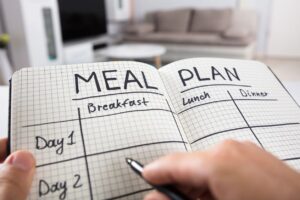In the battle to get strong and lean, knowing is one thing; taking action on what you know is an entirely different beast.
As a strength and nutrition coach, I have a lot of knowledge of it takes to get leaner, stronger, and to build muscle in the gym.
I just wasn’t doing it.
That’s why I recently hired a nutrition expert to coach me for twelve weeks and help improve my diet, figure out how many calories and macronutrients I should be eating to support my training, and consistently stick to those macros.
If you’ve ever struggled to stick to a diet, this article is for you.
I’m about to share the ups and downs and the lessons I learned from my twelve-week session working with a nutrition coach – all with the hope that you can use these lessons to better understand how to simplify your own nutrition and consistently stick to whatever diet you choose to follow.
Lesson #1
What gets measured, gets managed
If I had a dollar for every time someone in my own nutrition practice told me, “I eat pretty healthy, but I can’t lose weight,” I’d have a lot of dolla dolla bills. The fact is, unless you’re keeping track of what and how much you’re eating, you have no way of knowing how healthy your diet actually is.
I had fallen into this trap with my own nutrition. I was making generally healthy food choices, eating lots of fresh, whole foods, but I had no clue how much food I was eating until I started measuring and tracking my meals.
The data didn’t lie: I was sometimes overeating and sometimes under eating; worse, the balance of my macronutrients (protein, carbs, fat) was way out of whack.
When I broke out my dusty food scale and started measuring (most) of the food I was putting on my plate, I gained a very clear understanding of how much I was eating and had a reliable method to increase or decrease serving sizes of foods in order to get the nutrients my body requires.
Lesson #2
There’s never a perfect time
Bless my coach’s heart. In our time together, I had several weekend ski trips, a beach vacation, a music festival, friends and family visiting from out of town, and project deadlines I was working toward. In other words: there wasn’t a single “normal” week of meals in our twelve-week program.
The silver lining of my crazy schedule was that I learned to balance eating healthy with having a social life, traveling, and meeting work obligations. No day or week was “perfect,” but neither is life. You’ll always face some kind of obstacle to eating well – whether it’s an unsupportive partner or roommate, or a crazy work or travel schedule. You’ve just got to learn to roll with the punches and do the best you can at any given moment.
Lesson #3
Plan ahead – “If you fail to prepare, then prepare to fail”
Being a nutrition coach myself, I thought I could wing it and still hit my macro targets. Not so.
In the first couple weeks of winging it, I hit my macro targets one measly time. It wasn’t until I got my shit together and started planning meals ahead of time that I was able to hit the targets my coach gave me – not perfectly every day, but within the ballpark.
The key to the nutrition coaching program I used was hitting the targets given to me within +/- five grams of the actual target. This allows for a little wiggle room because, let’s face it, we’re all real people and not robots.
By getting within +/-5g, my coach and I would be able to see if the targets were “working” (ie, advancing me to my goals) or not. By failing to hit my targets consistently, I was making it a lot harder for my coach to figure out whether we needed to make adjustments. Basically, all the data I collected throughout the week was meaningless if I was 15g over on carbs one day and 10g over on protein the next.
When I finally realized that I couldn’t wing it and stay consistent, I was forced to plan ahead. This made me a lot more consistent, and I started seeing positive results in things like scale weight, body composition, and energy levels.
With consistency, I was able to report useful data, which made it easier for my coach to see what worked and adjust my numbers accordingly.
Translation: better planning led to consistent data and a clearer picture of how to accelerate my results.
So don’t think you can “wing it” and get the results you’re looking for!
Lesson #4
Learn to cook, and do it more often
I’ll leave this one short. Your meals don’t have to be fancy, but making more of them at home is the easiest way to stick to a nutrition plan.
Lesson #5
Small wins add up
All of the tracking and planning led me to naturally make better choices.
I remember about halfway through my coaching program, I had a bit of a rough week, but I reported to my coach that I’d planned ahead for a friend’s cookout and stuck to my plan.
In the past, I would probably have adopted a “fuck it” mentality and eaten (and drank) whatever I felt like… but because I’d gotten in the habit of tracking my meals ahead of time, I’d developed a pretty good idea of what was going to fit into my day. I could confidently say “no thanks” to foods that would take me off plan and feel good about that decision knowing I was going to stay on track.
It took several small wins of hitting a carb target here, a fat target there, to get me to that place. Those small and seemingly insignificant wins over the course of several weeks added up to more confidence and self-control in social situations, which was actually a HUGE win for me.
Lesson #6
You don’t have to give up your favorite foods
There’s this misconception that you can lose weight or lean out so long as you “eat clean” or just eat healthy foods; the flip side implies that you have to give up pizza and ice cream to lose weight. This is NOT true.
Over the course of twelve weeks, I ate more carbs and ice cream than I probably had in the previous year – and I lost scale weight while improving my body composition.
 Read that again: I lost weight eating ice cream.
Read that again: I lost weight eating ice cream.
No joke. I probably ate ice cream four to five nights out of the week.
The thing is, the food you eat doesn’t matter one bit, so long as you control your overall calorie intake and make sure you’re getting enough macro- and micro-nutrition (protein, carbs, fats, vitamins, and minerals).
When I started the program, I was eating far too few carbohydrates to support my active lifestyle. I wouldn’t say I was “afraid” of carbs, per se, but I’d gotten in the habit of avoiding them from a long, messed up history of dieting years ago. My coach helped me ease carbs back into my life, and my energy and body composition improved.
Demonizing food groups isn’t doing you any favors. In fact, it may be contributing to a messed up relationship with food. Cutting out foods, especially your favorites, is not sustainable. And who wouldn’t love an opportunity to tell your friends you’re losing weight while eating ice cream?
Lesson #7
You don’t have to give up any foods, but cutting out your trigger foods may be necessary
Yeah, I know, I just said you don’t have to give up your favorite foods… but sometimes there are foods that trigger you to overeat, and they’ve just got to go.
For me, that food was chocolate covered almonds. I used to have a handful (or two) of those delicious chocolatey treats basically every night, but you know what? A serving size was eight measly almonds. EIGHT! I was eating at least twenty of them (before tracking) without even thinking about it; possibly more than twenty, since I wasn’t counting them before.
When I portioned out eight chocolate almonds, I felt unsatisfied and almost always went back for a second serving.
I finally realized I just needed to break up with chocolate covered almonds for a while. That doesn’t mean I stopped enjoying a sweet treat after dinner – I just switched to low-cal ice creams like Halo Top and Yasso bars to get my fix without blowing my macros out of the water every night.
Lesson #7.5
You don’t have to give up alcohol, but cutting back couldn’t hurt
 I found out by tracking my alcohol consumption (along with weight, performance, and energy) that drinking wasn’t doing me any favors. The day after I’d had any alcohol, I woke up weighing more, I felt tired, and my workout motivation and performance suffered.
I found out by tracking my alcohol consumption (along with weight, performance, and energy) that drinking wasn’t doing me any favors. The day after I’d had any alcohol, I woke up weighing more, I felt tired, and my workout motivation and performance suffered.
When faced with the nutrition information in your favorite adult beverages, you quickly realize that you’d rather eat those calories anyway.
That said, I didn’t quit drinking over the twelve weeks I worked with my coach. Instead, I curbed my intake and established boundaries like “I’ll have two beers” when I met friends at a brewery instead of sampling the entire line up. This allowed me to have a social life without going off plan every weekend.
Lesson #8
Change is hard!
There’s no sense in pretending otherwise. At the outset of my coaching program, I thought, “I’m a coach, this is gonna be a breeze. Give me my macros, I’ll cook and eat, hit the targets… easy peasy.” Nope. Think again.
It was humbling to realize that, though I have professional experience in nutrition, it was pretty tough to hit my daily targets at first. And I realized – it’s hard for everyone! If changing your diet were easy, everyone would be walking around with a six pack. Alas, that is not the case.
Be prepared to stumble, struggle, and course correct on the road to getting lean or jacked or whatever name you put to your physique goals. The journey will not be easy. It will not be linear, either. You will take one step forward, two backward at times. But you’ll get where you want to be so long as you keep trying and keep moving forward.
Lesson #9
Support is key to success
Despite knowing a lot about nutrition, I struggled to implement what I knew on my own. That’s why I hired my own coach.
Coaching support was absolutely essential in getting myself back on track. My coach provided objective feedback for the times I thought I was doing pretty good (“you could do this better”) and positive support when it felt like I was royally messing up my entire plan (“look at this thing you’re doing well, despite all the stuff you’ve got going on”).
External feedback from a coach cuts through your personal BS and helps you decide what is and is not working, so that you can make improvements.
Coaching helps you cut through all the marketing and informational BS that’s out there, too. Had I not worked with a coach, I would have tried all the different dietary approaches in my own arsenal and never made any progress at all. My coach provided direction and accountability so I stuck with our plan long enough to make progress. Her support was essential for keeping my eyes on the prize, even when I felt tempted to try something different.
The twelve-week program helpful to me on a personal level because I consistently ate better and made healthier choices during social situations. But more than that, the program was invaluable to me professionally. I’ve already started integrating these lessons into my own coaching so I can better serve my own clients.
Need help with your own nutrition?
Apply for a free coaching call and we’ll discuss your health and fitness goals. If you’re a good fit for my coaching program, I’ll develop a simple nutrition plan customized to YOU and your exact needs. I’ll coach you through the plan, helping you stick to it so you learn what and how much to eat for yourself. You’ll gain the confidence to make healthier food choices that support your goals to lean out, get strong, and kick butt.

